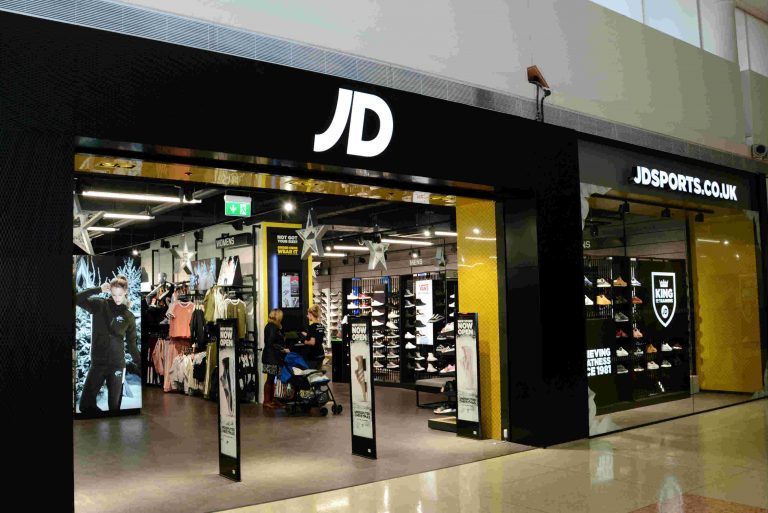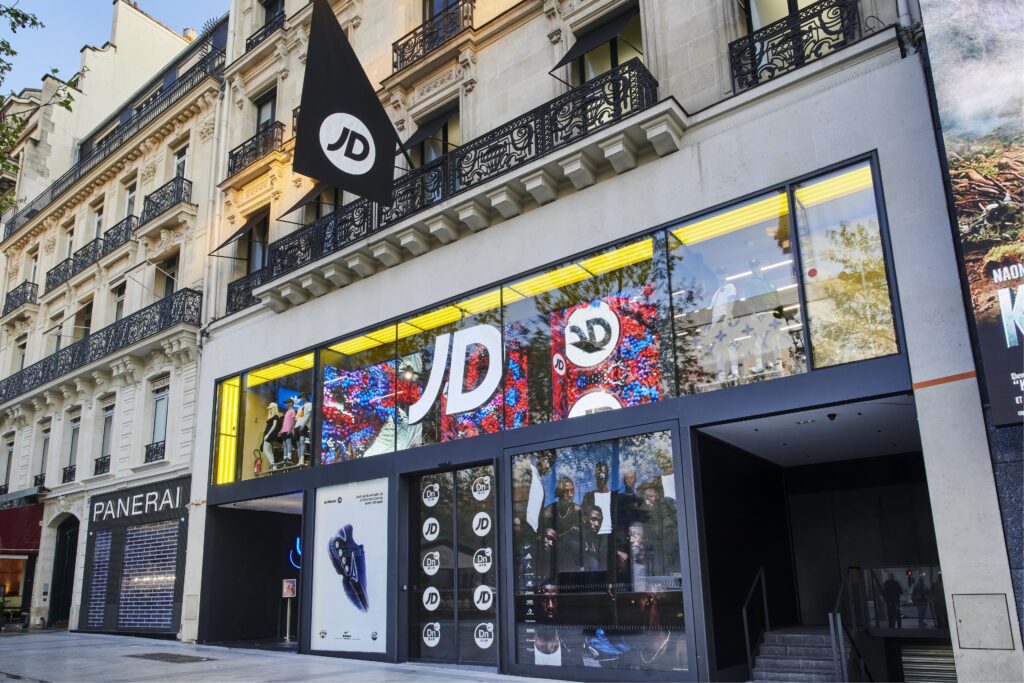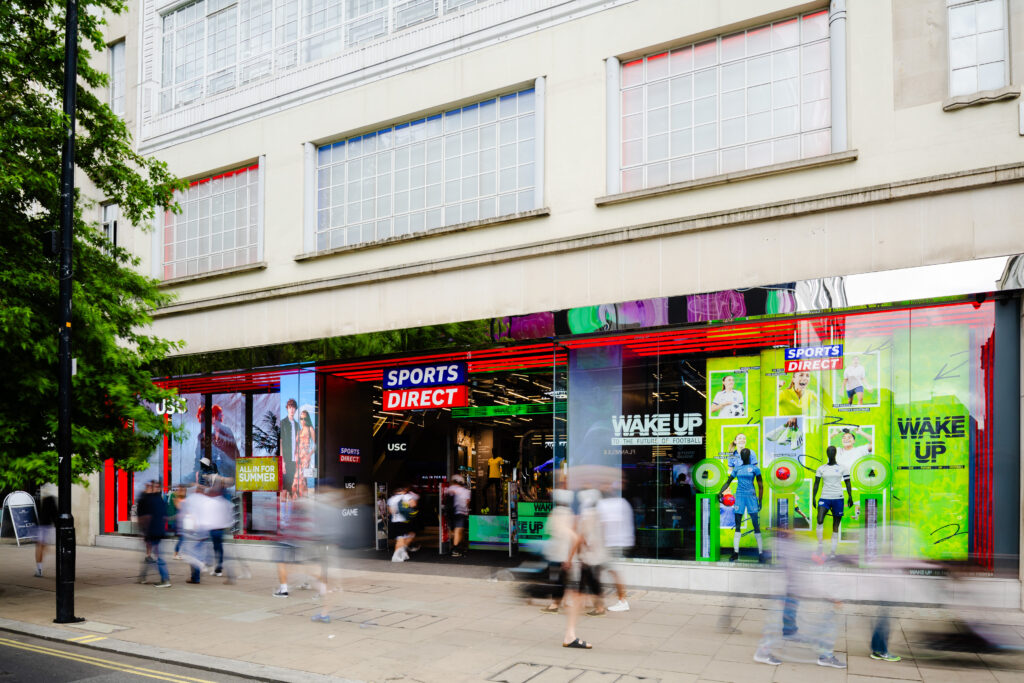JD Sports has continually shrugged off any suggestion of a challenging retail environment despite the impact of Covid-19 on the industry in the last year.
In April 2019 – well before the pandemic – JD Sports executive chairman Peter Cowgill told The Telegraph that people “no longer frown at you for wearing sportswear”. Indeed, this has proved even more accurate at a time when people have ditched formal, evening or corporate wear due to lockdowns and stay-at-home orders, and opted for athleisure, casual and loungewear instead.
This further boosted JD Sports’ sales in the 22 weeks to January 2 where total revenues, on a like-for-like basis, rose by more than five per cent year-on-year. The self-proclaimed “King of Trainers” also forecast profits for the current financial year to be “significantly ahead” of predictions.

While JD Sports also its Christmas trading update to warn that its UK stores were “likely” to be shut until at least Easter due to a national lockdown, said customers “readily switched” between its stores and its online business. This begs the question: Is JD Sports outpacing rivals due to its robust online channel?
“JD Sports’ success as a multi-brand retailer rests in a combination of service, range and customer connectivity,” said Laura Morroll, senior manager at management consultancy firm BearingPoint.
“The business has invested significantly in digital and the digitally savvy tendencies of their target customer means that even in Covid-19 times they have been able to maintain a dialogue with their customers that have more readily transferred to online channels to shop.
“Recent investment in its online fulfilment capabilities from its Rochdale distribution centre mean that they can more effectively respond to online growth and customer demand for speed.”

JD Sports was founded by John Wardle and David Makin in 1981 with a single store, John David Sports, opening in Bury. It soon expanded into Manchester’s Arndale Centre, along with further openings across the North and the Midlands throughout the 1980s.
The first London store opened on Oxford Street in 1989. In 1996, JD Sports made its debut on the stock market, valued at 15p a share. At the time, it had 56 stores. In 2002, it acquired added 200 more stores to its portfolio after it took over the First Sport chain.
In 2005, Pentland Group – which operates raft of fashion and sportswear brands, like Speedo, Lacoste, Ellesse, Boxfresh and Canterbury – acquired a 45 per cent stake of JD Sports from Wardle and Makin. Pentland Group is now the majority owner of JD Sports, with a stake of around 58 per cent.
JD Sports’ growth over the years has allowed it to climb the stock market. In June 2019, it made its debut on the FTSE 100 in the wake of rising sales and profits, as well as a string of acquisitions and global expansion – particularly Australia and the US.

Since it was founded, JD Sports has effectively become a retail empire. Aside from the flagship JD Sports fascia, the firm also owns other high street names such as Blacks, Finish Line, Fishing Republic, Footasylum, Footpatrol, Go Outdoors, Scotts, Size?, Tessuti, Ultimate Outdoors. And just earlier this month, it acquired Wellgosh.
Paul Kirkland, retail development director at Fujitsu, argued that JD Sports’ success comes down to its “first class mix of brands” that is focused on the right markets and customers.
“They have a first class acquisition strategy in large markets such as US and across EMEA where they’re growing exponentially,” he told Retail Gazette.
However, the retailer has faced its fair share of struggles in the last year. In its recent Christmas trading update, it warned that Covid-19 continued to create an uncertain outlook and that closures of its stores in other countries were “possible at any time”. It had also previously stated that its pre-tax profits in the six months to August 1 plunged by 68 per cent to £41.5 million as a result of weak footfall.

In June, JD Sports placed its Go Outdoors fascia up for administration – which it called a “difficult process” and called for “rental realism” as the pandemic continued to affect trading.
Citing the impact of Covid-19 closures, as well as “extremely inflexible” terms on its property leases, JD Sports said that the “the future viability of the business has become materially uncertain”.
Most recently, JD Sports became one of the latest retailers to suspend its click-and-collect service to help curb the spread of Covid-19.
Nonetheless, JD Sports labelled itself the “leading international multichannel retailer of sports, fashion and outdoor brands” in its 2020 annual report.
While its long-standing rival Sports Direct has been focusing on expanding its UK portfolio of retail businesses, JD Sports has arguably focused on developing its online presence. This has benefited the company at a time when stores have been forced to shut.
Moreover, while Sports Direct appears to favour slashed prices to drive sales, JD Sports has preferred to position itself as a go-to destination for full-priced, premium products. Furthermore, Sports Direct owner Mike Ashley seemingly wants to act as undertaker to the UK’s embattled department store sector.
Ashley’s Frasers Group – which owns Sports Direct and issued a profit warning in December – snapped up House of Fraser in 2018 and had shown interest in liquidated department store chain Debenhams on several occasions.
Meanwhile, JD Sports has paid attention to its store proposition. In 2019, it opened an 8000sq ft superstore in Essex shopping centre Eastgate. The acquisition of Footasylum also arguably cemented its hold on the high street.
Cowgill said in 2019 that there are “no plans to fundamentally alter the size of JD Sports network in the UK” despite being aware of the financial benefit that other retailers appear to get when they downsize.
Hugh Fletcher, head of consultancy at ecommerce agency Wunderman Thompson Commerce, said JD Sports has embraced multichannel retail, “building exciting and enticing physical stores, creating a strong online presence, and linking this with a social media presence which is part inspiration and part hard sell”.
“While Covid-19 and national lockdowns may have impacted the role of the high-street, omnichannel includes the ability to shop across all devices and interfaces – laptop, phone, app and social media,” Fletcher added.
Kirkland said JD Sports has a “deep understanding of customers” and remains ahead of trends.
“Their marketing focuses on a mix of channels from strong socials i.e. Instagram influencers that are relevant to their target market, plus large sports stars such as Anthony Joshua,” he explained.
“Their omnichannel strategy is also on point as when stores were forced to close they had the online platform and reach to drive increased sales backed up by a first class supply chain and fulfilment capability.
“They also offer flexible payment options such as Klarna – and splitting the payments interest free which helps those who are financially restricted.”
JD Sports has arguably shown its rivals that it may be crucial to provide a seamless channel during Covid-19. It is backed by a strong supply chain and it has formed partnerships with some of the world’s largest sportwear brands, such as Nike, Adidas and Under Armour. This is key when it comes to online capacity, capability and fulfilment during a pandemic.
Sports Direct, on the other hand, called for an investigation on Adidas and Nike in October 2019 after Adidas blocked Sports Direct from selling some of its products – which suggests an ongoing conflict, rather than close ties. The retailer also complained that JD Sports’ £90 million takeover of Footasylum could reduce Sports Direct and Frasers Group’s access to the top brands.
Meanwhile, JD Sports has witnessed a real growth area in social media. In addition, its flexible payment solutions and strong customer fulfilment options has helped speed up its business during the pandemic, at a time when other retailers have stood still or responded at a glacial pace.
Overall, JD Sports’ success seems to have emerged as a combination of both strong market positioning and essential strategic choices. Perhaps it would be more fitting to re-label itself as the King of Multichannel.
Click here to sign up to Retail Gazette’s free daily email newsletter

















